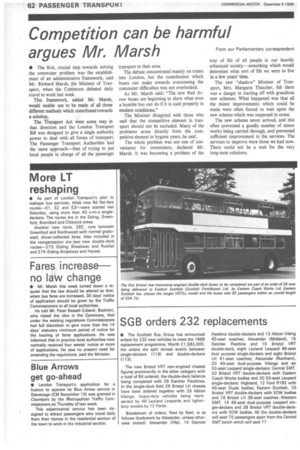Competition can be harmful argues Mr. Marsh
Page 64

If you've noticed an error in this article please click here to report it so we can fix it.
From our Parliamentary correspondent • The first, crucial step towards solving the commuter problem was the establishment of art administrative framework, said Mr. Richard Marsh, the Minister of Transport, when the Conimons debated daily travel to work last week.
This framework, added Mr. Marsh, would enable use to be made of all those different methods which contributed towards a solution.
The Transport Act went some way in that direction and the London Transport Bill was designed to give a single authority power to deal with all forms of transport. The Passenger Transport Authorities had the same approach—that of trying to put local people in charge of all the passenger transport in their area.
The debate concentrated mainly on trains into London, but the contribution which buses can make towards overcoming the commuter difficulties was not overlooked.
As Mr. Marsh said: "The new Red Arrow buses are beginning to show what even a humble bus can do if it is used properly in modern conditions."
The Minister disagreed with those who said that the competitive element in transport should not be excluded. Many of the problems arose directly from the competitive element in bygone years, he said.
The whole problem was not one of convenience for commuters, declared Mr. Marsh. It was becoming a problem of the way of life of all people in our heavily urbanized society—something which would determine what sort of life we were to live in a few years' time.
The new "shadow" Minister of Transport, Mrs. Margaret Thatcher, felt there was a danger in starting off with grandiose new schemes. What happened was that all the minor improvements which could be made were often forced to wait upon the new scheme which was supposed to come.
The new scheme never arrived, and this often prevented a goodly number of minor works being carried through, and prevented sufficient improvement in the services. The services to improve were those we had now. There could not be a wait for the very long-term solutions.








































































































































































